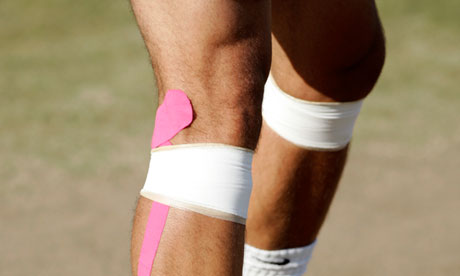
Everything was going swimmingly. I was in my eighth week of training for my first marathon – Paris, at the beginning of April. I was mindful not to overdo it and had only increased the length of my runs by 10% each week. I stretched religiously, fuelled up adequately and ate a balanced diet – going as far as sprinkling chia seeds on my porridge. Hell, I even foam-rolled my tight calves a few times a week.
And then, on my 28k run, disaster struck. My right knee started to hurt. By the next day, I couldn't climb a flight of stairs. It's been two weeks and I am still grimacing when I stand up. No more tempos, no more long training runs, no more endorphins: I have been relegated to the naughty corner, the losers' bench, with a big red time-out card to boot. To say I am frustrated is to put it mildly. I'm furious and I'm gutted. With each passing day my chance of crossing the marathon finish line is diminishing. With every run I have to skip, my fitness decreases. Having to take a rain-check is looking more and more likely – though I haven't yet given up all hope.
To get through my little predicament with a smile is an uphill battle: the mental game that's involved with dealing with a sports injury loosely reminds me of Alcoholics Anonymous's 12-step programme. To my mind, it looks like this.
The denial stage
This is where runners will pretend their ongoing calf pain isn't really that problematic, or that their foot isn't really aching – after all, running is fraught with aches; it's part of the process. It's supposed to hurt, right? That's what I thought when I embarked on a long training run with an uncomfortable knee, reasoning that it was just part of the game. A day later, I couldn't walk 20 metres without cringing.
The acceptance stage
This is where runners come to their senses and realise that their favourite activity has to be put on the backburner for the time being. Withdrawal symptoms include restlessness, anger and boredom as you have to park yourself on the sofa to watch a TV series, when you'd much rather spend your Sundays on the trails.
The inventory stage
Runners will spend their free time thinking about how the injury could have been avoided, often flogging a dead horse. Sometimes, the answer is obvious (did you really think you could tackle 20k barefoot-style when you had never tried Vibrams before? Did you not employ the Rice technique as soon as atypical pain flared up?). Sometimes, it's plainly just bad luck.
The substitution stage
The stage in which runners will try to remain active by any means necessary. This often involves throwing money at the problem. First stop: a qualified physiotherapist, who will give you scores of tedious exercises to do at home (has anyone ever enjoyed sets of squats? No? Didn't think so). Biking, swimming and running in the swimming pool – low-impact activities – are generally considered valid forms of cross-training. If you're feeling fancy, using an anti-gravity treadmill is all the rage – but at about £20 for 30 minutes, you'll need the financial means. But none of it will satisfy you, as the only thing that will take you to the finish line is time spent on your legs.
The commiseration stage
When everything else fails, runners might consider doing some reading. There are tonnes of inspirational tales about athletes who have made remarkable comebacks after their injuries, as well as myriad blog entries by amateur runners about the importance of staying positive through the process. There are also plenty of message boards where you can whine to your heart's content.
I'm currently stuck in the substitution stage, but by writing this blog I'm hoping to make it to the last one. So, over to you: can you lift my spirits by sharing your best injury recovery stories? What worked for you, what didn't, and how did you make it through without becoming the grumpiest runner who ever lived?

